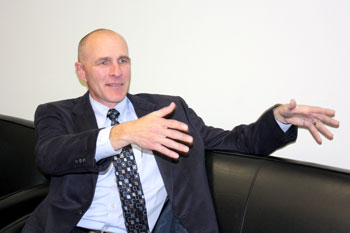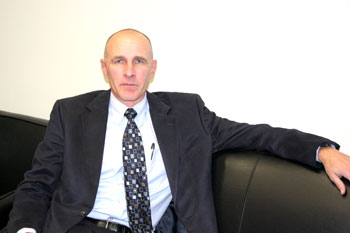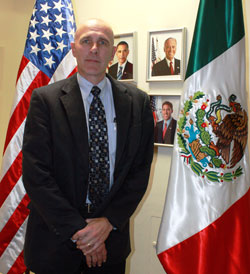Tom Delaney has worked for the Unites States International Development Agency (USAID) for 23 years, in Egypt, Iraq and Central Asia (a regional covering Kazakhstan, Kyrgyzstan, Uzbekistan, Tajikistan y Turkmenistan). He served as Deputy Director of the agency, and also worked at USAID Peru, Armenia, the West Bank of Gaza, Guatemala and Washington. He is a graduate of the US Marine Corps as an artillery officer.
He is the director of USAID Mexico since July of 2011, and in this interview he spoke about current trends in international development cooperation in the world, the work of USAID in Mexico, and the role and challenges faced by the AMEXCID, the recently created Mexican Agency for International Development Cooperation.
- Why is international development cooperation important?
T.D.- Development depends on many factors; in some African countries cooperation has to do with the transfer of funds, because there is a gap in the capacities and resources of the country. In other countries, where there is no such gap, international cooperation takes place because of the existence of common interests and objectives.
Whether this is a bilateral or a multilateral relationship, the benefits obtained are resources, experience and knowledge that can be shared to improve conditions, or respond to the needs and objectives of one, two or all the parties. If we put together the efforts and resources, then there is a better chance of success.
Although each party will have its own interests and agenda, the goal is to identify the convergence of these agendas, determine how to support local efforts and promote the objectives of the government of the United States (USA) and the government of each cooperation institution.
- When did the USA begin its activities of international development (IDC)?
T.D.- We identify the Marshall Plan in Europe (1947), after the second world war, as the seed of our agency. The objective was to have a broad comprehensive program to support the reconstruction of allied countries in Europe. Later, in 1961, USAID was formally established by President John F. Kennedy.
Today, USAID is present is approximately 87 countries and its most expensive programs are in Afghanistan, Haiti, Kenya, Jordan and Pakistan.
As a US government agency, USAID is footed on bilateral relations in any country. It does not mean that there are no opportunities and experiences in multilateral initiatives. Although we are looking for opportunities for modeling triangular efforts, our primary mandate is to support bilateral relations and support the objective of the US government in any country.
- What are the trends of IDC?
T.D.- There was much debate in recent years about the most appropriate and effective way to use international cooperation resources for the development of receiving countries: we must go beyond assistance and work towards common objectives
There have been many changes in the way, approaches and the context in which our agencies work throughout the world. Currently, programs are designed and run responding first to local needs and initiatives, and we collaborate with the actors already working on development issues (such as governments, institutions, the private sector, donor organizations, civil society, local NGOs, foundations, etc.), we de not come from outside with initiatives and ideas. We have to find a more efficient way of coordinating with them, to bring together and organize all these resources, initiatives, and capabilities to better attend the needs of local populations and create institutions and processes supportive of the democracy, economic growth and sustainable management of the environment of receiving countries.
There is in Mexico institutional capacity in all sectors and at all levels of government, trade and civil society, so the starting point is always initiatives, ideas and the work done by these institutions. The leadership clearly belongs to Mexico.
This type of relationship and this way of working are ideal.
 - Does USAID concentrate all the US international development cooperation?
- Does USAID concentrate all the US international development cooperation?
T.D.- No and less now than before, especially in countries like Iraq or Afghanistan, where contributions from the entire US government are necessary, because the needs are so large, there is a necessity to take advantage of the resources and capacities of many agencies. There are other American agencies working and providing development assistance and cooperation. They have different objectives, but it is a form of cooperation and assistance.
- How much is the budget of USAID?
T.D.- In the last 10 years the global budget of our agency has increased significantly because of the large programs we started in Iraq, Afghanistan, Africa and other regions. For the 2011 fiscal year, the agency was allowed a budget of almost $24 billion.
As for Mexico, the budget allocated by USAID has also increased, due to the priority given to bilateral efforts in the Merida Initiative and climate change. The greater part of the budget is allocated to the Merida Initiative and is intended to support the security forces of the Mexican government. USAID uses a portion of these funds to support the reform process of the justice system, the strengthening of the social fabric in the northern part of the country (impacted by violence) as well as the promotion and protection of human rights.
Our program has always been relatively modest, since Mexico is a large country with a very strong and highly developed economy. This year we will be allocated $68 millions. However for me, and I think also for the Mexican government, it is not the amount that really matters but how it is used: the targeting of those funds to support Mexican initiatives seeking to achieve common goals.
Despite financial pressures we have maintained the USAID Mexico budget, given the urgency to deal with shared problems.
- What is the importance of an agency such as the USAID?
T.D.- The idea of cooperation to respond to the needs of other countries is not what the people in the streets are thinking about every day. However we recognize that events in other countries have an almost direct impact in ours. For good or bad, it is, in many ways, an interconnected world.
The American people are very proud of having abilities and advantages. With that comes the possibilities and, many would say, obligations of sharing these capacities with countries in needs; not as charity but as a way to cooperate and improve the capacities of our country.
I am not going to say at that we do not have interests. We will always have them, which sometimes leads to a kind of conflict, but there is usually an intersection and an opportunity to expand, and complement diplomatic efforts. Those interests can be advanced through cooperation.
- As the Director of USAID Mexico, what is your opinion about the AMEXCID?
T.D.- There are few countries that can really act as a bridge between other countries, international institutions handling cooperation programs, and the countries that have traditionally received assistance. Mexico is one of those few, because it has the level of development, resources and the institutions to be a member of the group of international implementation agencies, and also because Mexico has experience and a point of view very valuable to developing countries.
For these reasons, having an agency with the dual mandate of coordinating cooperation programs within Mexico and of providing assistance to other countries, could be very valuable from various perspectives: global and from international systems and initiatives. Because the AMEXCID not only sees a program, but observes how all programs are getting together, and thus knows how to work better to respond to priorities, not from one sector but from the Mexican government.
 - From your perspective, what are the challenges facing the AMEXCID?
- From your perspective, what are the challenges facing the AMEXCID?
T.D.- One of AMEXCID's challenges is to define its role both with Mexican government units which are already working with international and cooperation agencies in their specific sectors, as well as with those agencies.
I have seen it in other countries: it might be difficult for others to see the agency as a necessary institution, rather than an obstacle or one more unit making things more difficult.
Another challenge will be to know all the cooperation already taking place through various units of the Mexican government, in order to play an effective role and avoid duplicating the work of cooperating institutions and government agencies. There is no perfect way to do this. We must work, improve, refine and recognize that these challenges and complications will happen and need to be addressed. In addition, it will be necessary to recognize the impact and perspectives of cooperating institutions and program specific counterparts.
